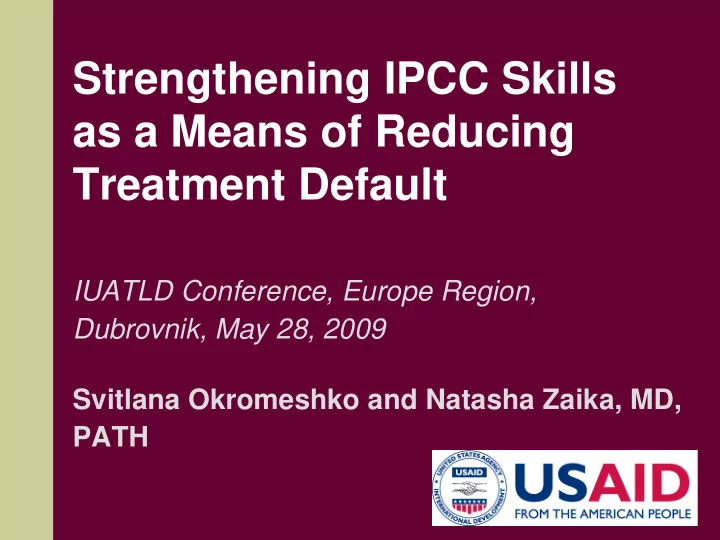

Strengthening IPCC Skills as a Means of Reducing Treatment Default IUATLD Conference, Europe Region, Dubrovnik, May 28, 2009 Svitlana Okromeshko and Natasha Zaika, MD, PATH
PATH’s TB/HIV Work in Ukraine • PATH is international NGO doing both HIV and TB work in Ukraine • Since 2001, pilot and expand DOTS introduction � Advocacy, lab and surveillance strengthening � Public awareness and patient education � Provider training, clinical and counseling � Prisons (as of 2006) � Strengthening HIV/TB service integration
Stigma – Major Barrier • 69% of PLHA report being denied health care • 70% believe confidentiality has been violated • 18% feel comfortable revealing HIV status to medical provider Taken from: International HIV/AIDS Alliance in Ukraine, Access to Rights and Services of PLHWA in Ukraine: Social Research Results, March 15, 2004, Kyiv.
Exit Survey of TB Outpatients Goal – collect information on aspects of provider performance that could be improved through communication and counseling training � emotional support � active listening � providing information � privacy and confidentiality • Baseline in 2004 – N=312, 10 facilities, Kyiv and Donetsk • Final in 2006 – N=313
IPCC Training Goal - strengthening interpersonal communication and counseling skills Four sections: 1. Interpersonal communication 2. Main steps of effective counseling 3. Counseling on TB 4. DCT of TB patients on HIV
Effective Counseling Counseling – is a partnership of experts • Client-centered vs. physician-centered • Private and confidential • Interactive • Individualized for each client
IPCC Trainings From 2004 to 2006, PATH staff trained 358 TB doctors in 5 regions (including 186 in Donetska Oblast and Kyiv City) Training methods: • Brainstorming • Role playing • Video • Video playing • Case study
Patients’ Satisfaction re: Interaction with Medical Provider Baseline Final Indicator (2004) (2006) Medical provider’s ability or willingness to: Make patient feel comfortable 60% 70% Allow patient to share concerns and questions 34% 86% Understand patient’s concerns 43% 63% Explain health information in simple language 51% 88% Explain the treatment options 33% 84% Provide advice about how to talk with family 31% 74% about TB How doctor dealt with disruptions during visit 15% 74% Ensuring patient of confidentiality 21% 42%
Medical Providers • “We are tired of everything; we are working because there is nothing else we can do. I don’t want to go to work. I go because there is no other option. I need to earn money to live.” • “Why do we need to pay attention to our patients if no one pays attention to us?” • “We are pressured by multiple demands; work with our patients is ungrateful and difficult.”
Impact of the Trainings An important indicator for measuring success of the IPCC trainings is treatment default rate and indirect evidence – treatment failure Data of cohort analysis in Donetska oblast 2004 2005 2006 Treatment default 16% 10% 11.7% Treatment failure 15% 8% 7%
Medical Providers “ I want to say thank you to your training program for my new attitude: before the training, I felt I had to treat anti-social, unpleasant, hopeless, homeless people and felt that they were not people at all. Now I come to my office to take care of real people who need my help. ”
Challenges • Perception of priority • Prevailing stigma • Underpaid and undervalued providers • A slow and labor-intensive process
Svitlana Okromeshko Program Officer, ACSM svitlana@path.org Natasha Zaika, MD Program Officer nzaika@path.org www.path.org
Recommend
More recommend